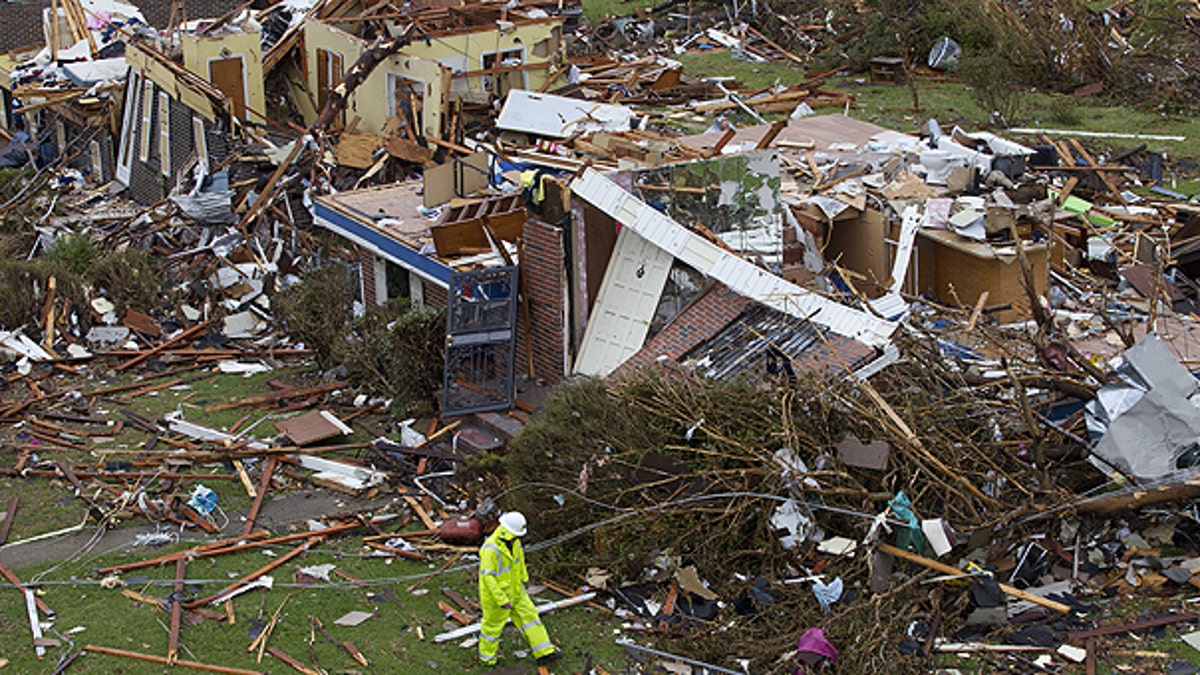
May 3: ineman Derrick Heisz of Broadhead, Wis., checks power poles in Pratt City, Ala. (AP)
BIRMINGHAM, Ala. -- The tornado that obliterated contractor Robert Rapley's house also swept away his livelihood, destroying his saws, his paint sprayer and his truck. Like thousands of others in a region already struggling with high unemployment, he now faces the prospect of trying to recover with no way to earn a living.
"We lost everything," Rapley said as he climbed on the wreckage. "I can't even go to work."
Thousands were thrown out of work by the twisters last week that killed 328 people across seven states in the nation's deadliest tornado outbreak since the Depression. Hundreds of factories and other businesses were destroyed, and many others were left without electricity.
The financial and economic toll is still being tallied, but officials in hardest-hit Alabama -- which had more than two-thirds of the dead -- said the damage there alone could rival the $1 billion in insured losses the state suffered in Hurricane Katrina in 2005.
"It's going to be extremely high," said Seth Hammett, director of the Alabama Development Office.
Many people were struggling to make ends meet even before the twisters flattened neighborhoods in Alabama, Tennessee, Georgia and Mississippi, where unemployment in March ranged from 9.2 percent in Alabama to 10.2 percent in Mississippi.
Curtis Frederick, 28, couldn't find any work to provide for his three children aside from delivering newspapers. Then a twister wiped out his mobile home park in Tuscaloosa.
"There's a lot of people that need help," he said. "We're struggling already from the economy being so bad."
Rain in several of the states on Tuesday added to the misery for those trying to salvage belongings from badly damaged homes. In gray and chilly Tuscaloosa, many lost everything, including coats, sweat shirts and sweaters, leaving them shivering in unseasonable temperatures in the low 50s.
Becky Curtis sat in the bathroom, one of the only dry spots in her small red-brick apartment, sorting through old cassette tapes. In another room, rain dripped through holes in the ceiling onto her hardwood floors.
"We're trying to get all this stuff out of here as fast as we can to save some mementoes," she said. The rain "definitely does not help."
In Birmingham, former Secretary of State Condoleezza Rice toured an aid and donation center in a neighborhood of her home city that was heavily damaged. She grew up in the city and still has family there.
"You realize that with every home that's flattened, there are dreams and memories that have gone with that home. So this is a very human tragedy," said Rice, who served in the George W. Bush administration.
One of the twisters destroyed a Wrangler jeans distribution center that employed 150 people in Hackleburg, an Alabama town of about 1,500. The town is in a county with an unemployment rate of nearly 13 percent.
"That one industry is the town," Hammett said. "Until they get back up and going again, that town will not be the same."
VF Corp., Wrangler's parent company, said it is looking into setting up distribution operations in another location nearby to allow people to get back to work quickly, and employees will continue to receive pay and benefits in the meantime. Eric Wiseman, chairility caused by living in different hotels for the past few days has kept her returning to her job as a nurse. She is having trouble sleeping.
"Every time I close my eyes I see trees, people walking and crying, debris everywhere," she said.
People thrown out of work by the storms will qualify for unemployment benefits as well as federal disaster aid.
It's tough to predict how long it will take for the stricken areas to recover, but the rebuilding projects could at least soften the economic blow.
"The rebuilding is huge," said Sam Addy, director of the Center for Business and Economic Research at the University of Alabama. "That brings in a lot of jobs and cash flow into the local area. For the larger economy, it's a loss."
In Birmingham, Rapley and his wife, Adrienne, survived the twister by taking cover in a storage room next to his garage. He carried her in -- she suffers from a brain injury -- and then they prayed: "The Lord is my shepherd." The deed to his property is gone, whisked away by the tornadoes. The house they shared for 20 years is destroyed.
For now, they are staying at a hotel, hoping they get federal aid soon.
"It's very expensive," Rapley said. "We're spending our last dime right now."









































